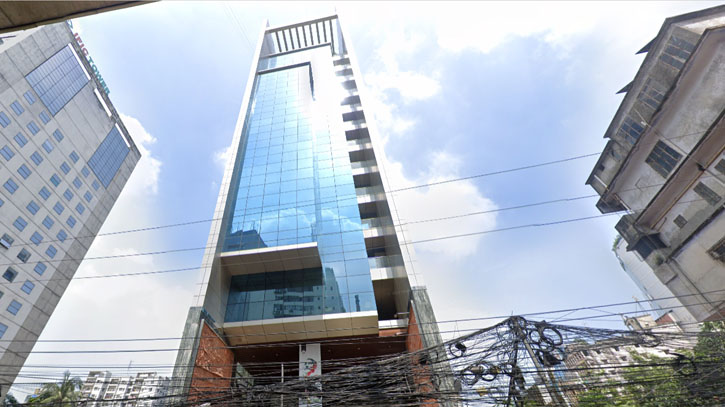
Photo : Messenger
Al-Arafa, one of the banks adhering to Islamic Shariah (a set of Islamic religious laws) in the country, is alleged to have violated Shariah principles, as numerous complaints have surfaced against the bank. The latest allegations involve the bank providing a loan of Tk 109 crore to its client with a surprisingly minimalistic collateral worth only Tk 16 crore. A Bangladesh Bank investigation report has unveiled these manipulations.
According to the Bangladesh Bank report, Badiur Rahman, the former chairman of the bank, approved the loan for M/s Chittagong Ispat just after taking charge of the bank’s chairmanship. In the 209th executive committee meeting of the bank, an LC (Letter of Credit) limit of Tk 75 crore was sanctioned in favor of the company. Utilizing this limit, Chittagong Ispat Company imported a scrap ship from the Singaporean company M/s Ariel Maritime Pvt Ltd for Tk 14.22 crore.
The Bangladesh Bank report raised questions about the money sent to Singapore. The central bank's investigation team inquired about how M/s Chittagong Ispat sent the money to Singapore, but no rational response was received from the company. Additionally, the company has not provided any information to Bangladesh Bank regarding the transfer of money. In the case of sending money abroad, permission from the relevant department of Bangladesh Bank is required; however, M/s Chittagong Ispat did not attempt to obtain any permission.
According to Bangladesh Bank rules, permission is required to send money abroad for investment, medical, or educational expenses, as outlined in a circular issued by Bangladesh Bank. However, M/s Chittagong Ispat disregarded this rule.
A top official of the relevant department of the central bank told The Daily Messenger, “If you want to send money for investment abroad, you have to obtain permission from Bangladesh Bank. Sending money without permission is considered money laundering. If proven, a money laundering case is filed. However, no such permission was sought (by M/s Chittagong Ispat) from us; hence, it is considered money laundering.”
According to the report, M/s Chittagong Ispat obtained the loan with direct support from Badiur Rahman, the then-chairman of Al-Arafa Islami Bank. Initially, a loan of Tk 75 crore was sanctioned as the LC limit. Subsequently, a total of Tk 109 crore was granted to the company in further processing. However, the company's actual amount of collateral was Tk 16.80 crore in getting the loan. The liability of the company, including interest and profit, has now increased to Tk 135.53 crore, but the company is not making any payments. Furthermore, M/s Chittagong Ispat has obstructed the recovery process by filing a lawsuit.
Banks are required to take collateral for lending, typically exceeding the loan amount. However, Al-Arafa provided loans with collateral of about 10 percent of the original loan, which is a serious irregularity. An anonymous source from the bank revealed that such irregularities were done in the interest of the chairman of the bank. The much-discussed loan implies a bad loan and financial loss.
Efforts were made to contact the managing director of the bank, Farman R Chowdhury, to inquire about this. However, calls went unanswered, and a subsequent message on WhatsApp received no reply.
Later, The Daily Messenger contacted Jalal Ahmed, head of the bank's public relations, who said, “I don't know about it. I will be able to provide information after knowing about it. The managing director is out of the office.”
Efforts to discuss this matter with the former chairman of the bank, Badiur Rahman, were unsuccessful. Calls to his personal phone number went unanswered, but an anonymous source from the bank told The Daily Messenger, “Several irregularities took place in the bank when Badiur Rahman was the chairman. However, no one could speak against that, as it was not possible to voice concerns against the chairman.”
Attempts to obtain comments from the company regarding the bank's obstruction of money collection through legal action were unsuccessful. No website for the company was found.
Mujahidul Islam, a lawyer of the Artha Rin Adalat (money loan court) and a panel lawyer of several banks, told The Daily Messenger, “A loan of 109 crores with collateral of 16 crores is a clear anomaly. It’s confirmed that the loan was granted against the rules. Both the client and the issuing bank knew that the loan was uncollectible. The bank should take appropriate legal action to recover the loan. Additionally, according to the report of Bangladesh Bank, a case should be filed against the company under the Money Laundering Act.”
The regulatory agency Bangladesh Bank brought up these irregularities in the investigation report but did not take any action. Attempts were made to contact the central bank spokesperson and Executive Director Mezbaul Haque to enquire about this, but he could not speak as he was in a meeting and did not respond to subsequent phone calls.
Ahsan H Mansoor, the former chairman of BRAC Bank, commented that this loan proposal could never reach the board if the bank's management did not support it. The economist, executive director of the Policy Research Institute, told The Daily Messenger, “There is a problem with loans that are approved with the chairman's connivance. Responsibility lies not only with the chairman but also with the managing director and other officers of the bank. They, too, should face punishment.”
He also added, “Even if this matter is raised in the Bangladesh Bank report, no action is taken in the end. If the report of the investigation team is either ignored by the top echelons or blocked in various ways, it is not acceptable from Bangladesh Bank as a regulatory body. If measures were taken in the beginning, the issue would not have escalated. Furthermore, the current bank board seems unwilling to take responsibility for the actions of the former chairman. Reasonably, they will not.”
Messenger/Fardin








